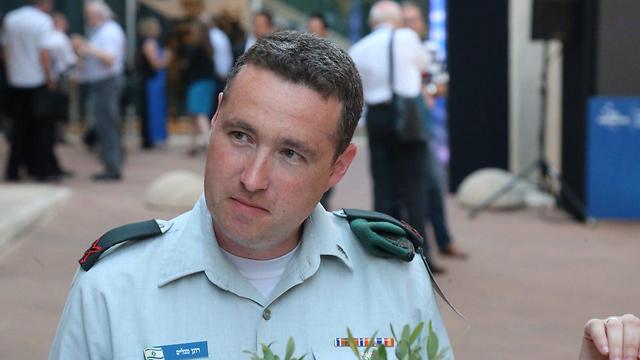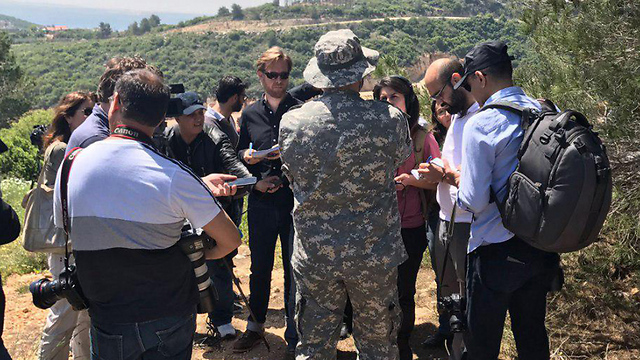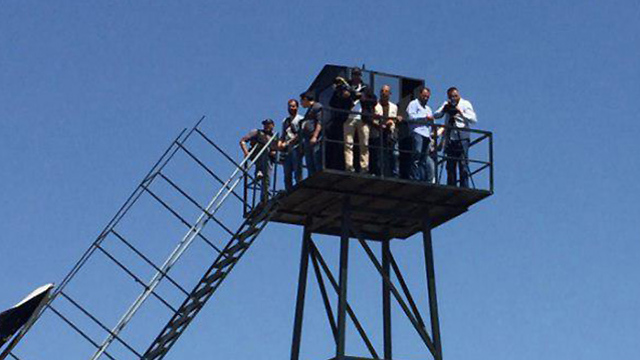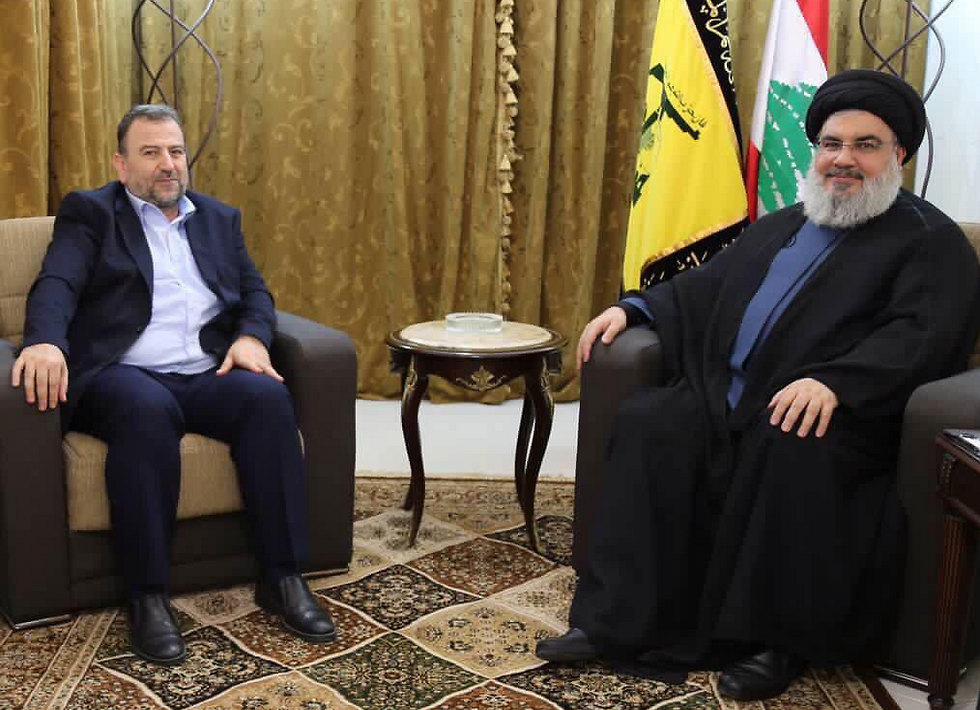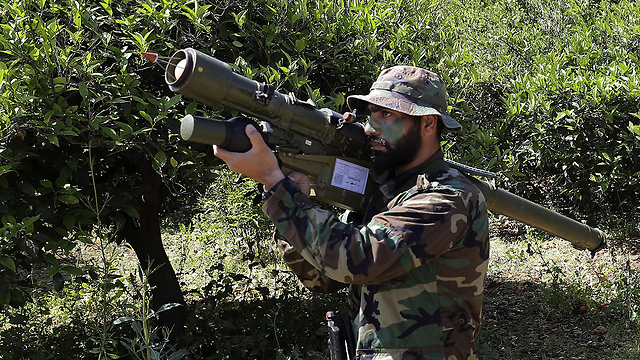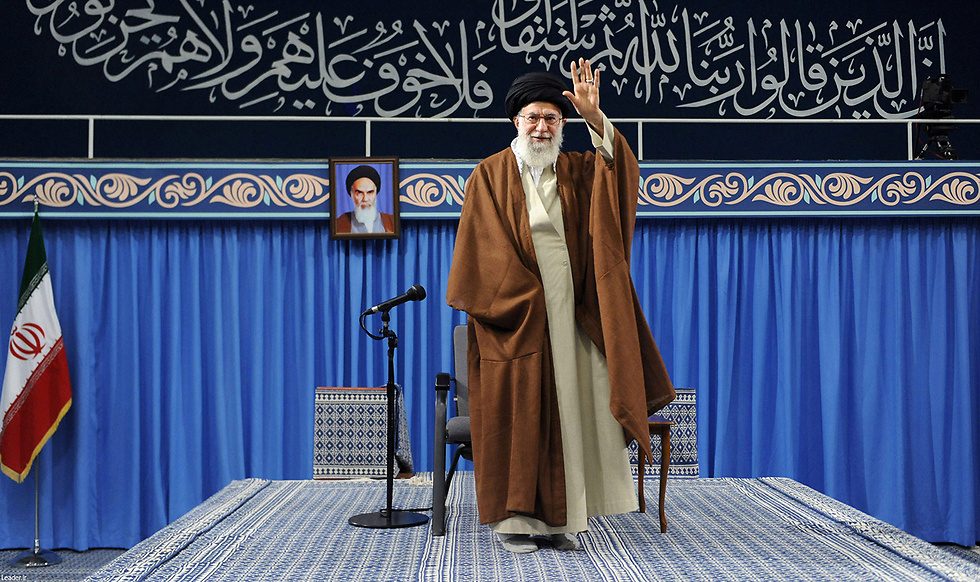

IDF spokesman: Lebanon has become 'one giant Iranian missile factory'
Warning against Iran's involvement in Lebanon and the mire it could plunge its citizens into, IDF's spokesperson calls on Lebanese people to wake up and recognize Islamic Republic’s gradual takeover of their country through its proxy, Hezbollah.
IDF Spokesman Brig.-Gen. Ronen Manelis published an op-ed Sunday on Lebanese opposition websites and Arab media and called on the people of Lebanon to open their eyes to the Iranian takeover of their country.
"Lebanon has turned—by its actions and omissions and by members of the international community turning a blind eye—into one large missile factory," Manelis cautioned.
The article, whose mere publication was irregular, was published on a blog dealing with affairs relating to the Arab world called "Al-Hewar al-Motamaden."
It was also published on the al-Masdar website, as well as on Voice Beirut, the radio network's news site. In addition, portions of Manelis's article were carried by local Palestinian news agencies—including Ma'an, the largest Palestinian news agency.
"It's no longer a transfer of arms, funds or consultation. Iran has de-facto opened a new branch, the 'Lebanon branch.' Iran is here. The IDF is ready and capable of (tackling) any scenario, and plans to improve its readiness further during the year," Manelis added.
"As we have proven in recent years, and anyone who should know this already does, our security red lines are clearly demarcated. We have proven that is the case every week. The choice is yours, people of Lebanon," Manelis wrote.
"When endeavoring to select my photo of the year on the Lebanese front," the IDF spokesman continued, "I find myself returning to the joint tour taken by Hezbollah's southern Lebanon sector commander and his friend, commander of one of the Shiite militias loyal to Iran, Qais al-Khazali.
"This unique image expresses better than anything else the Iranian involvement in Lebanon and raises the curtain from Iran's ever-tightening control of Lebanon. This unique phenomenon of 'terror tourism' is a concrete expression of the danger the Cedar State and the entire region face—the danger of a takeover by Iranian lackeys.
"The year of 2017, like the 11 years that preceded it since the conclusion of the Second Lebanon War, was characterized by relative stability on the Lebanese front. This calm was enjoyed by civilians on both sides," Manelis continued.
"The fact that children in sixth grade in northern Israel and southern Lebanon have never heard an alarm is the single most significant accomplishment of the Second Lebanon War and proof positive of the stability of Israeli deterrence and the memory still burned into the minds of the Lebanese regarding the severity of (Hezbollah Secretary-General Hassan) Nasrallah's previous mistake."
The IDF spokesman further noted that the army has used the preceding year for comprehensive improvement in its wartime readiness on the northern front, which included "programs, training sessions, procurement and significant drills, the most prominent of which was Northern Command's recruitment drill, held for the first time in two decades, which allowed to put the IDF's operational plans in the northern sector through rigorous testing."
Following up on that argument, Manelis wrote: "Throughout this entire time, the task of gathering intelligence barged ahead. The army's chief of staff and head of the Military Intelligence Directorate have already said that if our enemies knew how much we know about them, they'd be deterred for a great many years to come from initiating hostilities.
"We wrap up the year better and more powerfully prepared for anything that may transpire on the northern front, despite the fact we do not seek conflict."
The group that does seek conflict, according to the spokesman, is Hezbollah.
"The terror organization (Hezbollah) continued its involvement in battles that do not concern it and even successfully increased its list of casualties and the financial crisis it found itself in.
"The past year has been further proof that Hezbollah serves as an operational arm of Iran. In any place where there was instability, we discovered Iran's fingerprint, and everywhere we discovered Hezbollah's involvement.
"It sent thousands of fighters to Syria, exasperated the fighting in Yemen through hundreds of advisors, and even in Gaza—Nasrallah boasted that he had sent special anti-tank missiles to the strip and met with representatives of all the Palestinian terrorist organizations, some of whom also moved to neighboring Dahieh in Beirut this year," he wrote.
"Billions (of dollars) are flowing from Tehran through Beirut to anywhere in the Middle East where there is evil and terrorism."
Manelis noted that "in Lebanon, Hezbollah is not hiding its attempt to take control of the state," indicating this was "expressed in the following developments: A president who gives legitimacy to a terrorist organization, a prime minister who finds it difficult to function in the shadow of Nasrallah's bullying behavior, the establishment of terrorist infrastructures and factories to manufacture weapons under the nose of the Lebanese government, and the unhindered military assimilation into the population."
He went on to point out the terror group's bold transgressions of UN resolutions and warlike behavior against the Jewish state.
"Along the border with Israel, and despite UN Security Council Resolution 1701 prohibiting the presence of Hezbollah operatives in southern Lebanon, Hezbollah continued to challenge the interests of the Lebanese state," he stressed.
"Hezbollah operatives continue to patrol the border in civilian clothes and work in the heart of the population. Moreover, Hezbollah is trying to recruit and employ officers and soldiers from the Lebanese Armed Forces to achieve its goal.
"Shamelessly, Hezbollah also invited journalists on a special tour to show how it was honoring the sovereignty of the Lebanese state and the decisions of the Security Council. These violations do not threaten us. On the contrary, the difference between a violation that ends in a report to the UN and a violation that leads to deterioration of the region's security is first and foremost an Israeli decision."
'The future of the Lebanese citizens is in the hands of the dictator from Tehran'
At this point, the IDF Spokesperson addressed thee citizens of Lebanon directly, urging them to consider the true result of Hezbollah and Iran's involvement with their country.
"The ordinary citizen will be mistaken to think that this process turns Lebanon into a fortress. It will become no more than a barrel of gunpowder on which he, his family and his property are sitting," he asserted.
"One in every three or four houses in southern Lebanon is a headquarters, a post, a weapons depot or a Hezbollah hideout. We know of these assets and we know how to attack them accurately if required.
"The future of the Lebanese citizens is that of a pawn in the hands of the dictator from Tehran, and the heads of villages, towns and government institutions who see and choose to remain silent are also to blame."
Manelis explained that his reason for saying such things is because he believes it is the right thing to "warn the residents of Lebanon of the way Iran plays with their security and future.
"This is a year of struggle and a test about the way Lebanon will be shaped. The struggle stems from the friction between the need to bring about stability and economic prosperity in the country on the one hand, and the promotion of Lebanese political issues and the continuation of activities to implement the hegemony of Iran-Hezbollah on the other."
Manelis concluded by saying that the result of the struggle depends on two things: whether "the Lebanese state and the international community allow Iran and Hezbollah to exploit the naivety of the heads of the Lebanese state and establish a factory for precision missiles as they are trying to do these days, and whether Hezbollah under the auspices of the new electoral system will succeed in pushing the Sunni camp in the coming elections (May 2018) from holding onto the government and turning the country into an official Iranian state of patronage."














